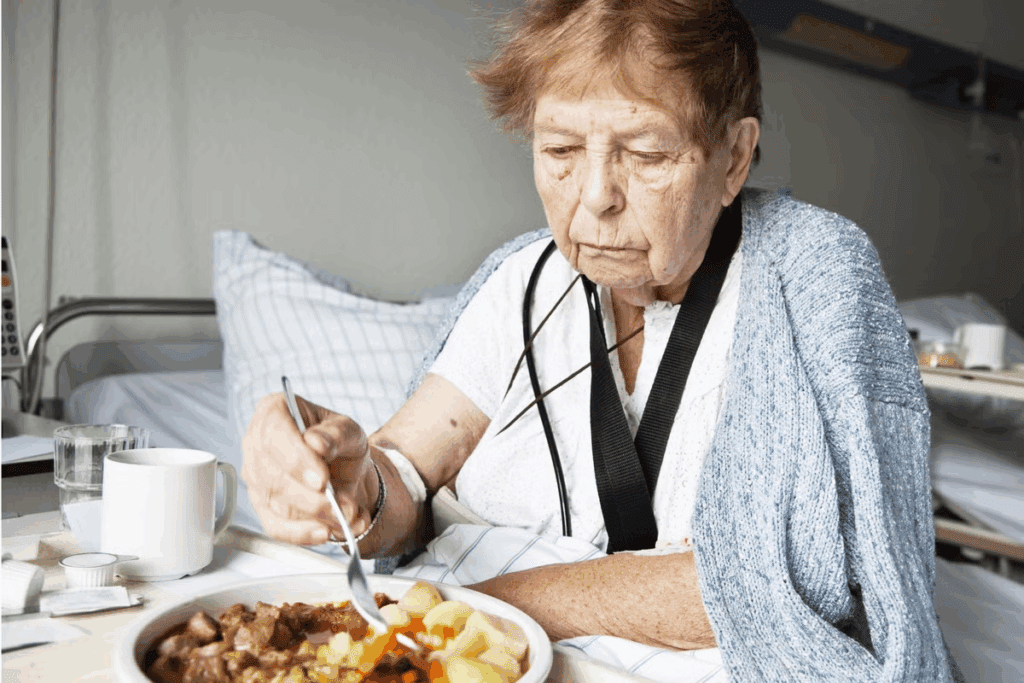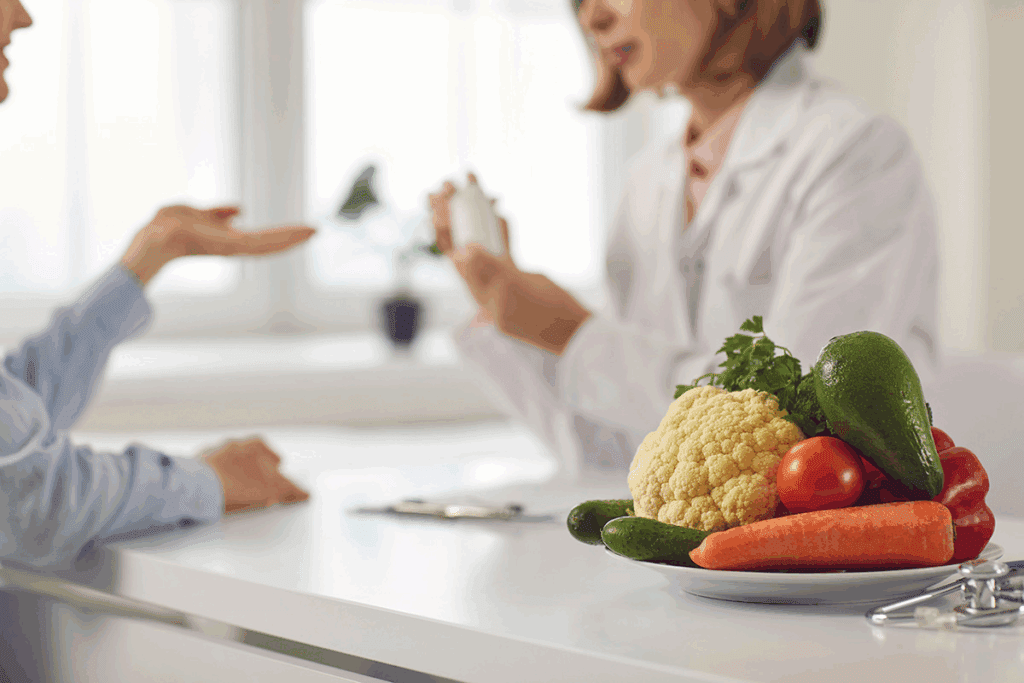Last Updated on November 26, 2025 by Bilal Hasdemir

A well-balanced pre-cancer colon cancer diet plays a key role in preventing colon cancer. Eating whole, nutrient-rich foods helps keep the colon healthy, which can lower the risk of developing the disease.

Diet is key in preventing colon cancer. Some foods help protect us. What we eat can raise or lower our risk of colon cancer. So, choosing the right foods is very important.
Our food choices greatly affect our colon health. Eating foods high in fiber, like plants, can lower colon cancer risk. Fiber helps keep the colon clean by promoting regular bowel movements.
Fiber-rich foods include whole grains, beans, lentils, fruits, and veggies. These foods are not just high in fiber. They also have antioxidants, vitamins, and minerals that boost our health.
Studies show that a high-fiber diet can lower colon cancer risk. A 2018 study found that those with colon cancer who ate more fiber had a lower death rate. This is compared to those who ate less fiber.
The benefits of fiber are many. It helps grow good gut bacteria, improves bowel habits, and reduces inflammation in the colon.
Knowing how diet affects colon cancer prevention helps us make better food choices. This can lower our risk of getting this disease.

A good pre-cancer colon cancer diet focuses on plants and balanced nutrients. Studies show that diet plays a big role in preventing colon cancer.
Eating lots of plant-based foods can lower colon cancer risk. These foods are full of antioxidants, fiber, and nutrients that protect the colon. Experts say to eat 1 to 3 cups of legumes a week for a healthy diet.
Legumes, like beans and lentils, are high in fiber and protein. You can easily add them to your meals, like in salads or soups.
It’s important to balance nutrients in your diet. This means eating lean proteins, healthy fats from nuts and seeds, and probiotics. Lean proteins like chicken and fish are good, and healthy fats from walnuts and chia seeds help your health.
Probiotics in yogurt and fermented veggies are key for gut health. A healthy gut is linked to a healthy colon.
| Nutrient | Food Sources | Benefits |
| Fiber | Legumes, whole grains, fruits | Promotes digestive health, reduces colon cancer risk |
| Antioxidants | Berries, leafy greens, nuts | Protects cells from damage, supports overall health |
| Probiotics | Yogurt, kefir, fermented vegetables | Supports gut health, enhances immune function |
Eating foods high in fiber can help fight colon cancer. Studies show that a fiber-rich diet lowers colon cancer risk. Fiber keeps the digestive system clean, reducing harmful substances.
Fiber is key to a healthy colon. It helps remove waste and toxins, lowering cancer risk. Foods high in fiber also boost overall health.
Whole grains are full of fiber and important nutrients like B vitamins and antioxidants. Adding barley, oats, and brown rice to your meals increases fiber intake. These grains are great for breakfast cereals and salads.
Barley has soluble fiber, which lowers cholesterol and improves digestion. Oats help control blood sugar and keep you full. Brown rice is fiber-rich and has manganese, aiding nutrient absorption.
Beans and lentils are fiber and protein sources. They’re great for those who eat less meat or follow a plant-based diet. These legumes are full of nutrients and may lower colon cancer risk.
Beans and lentils are easy to add to soups, stews, and salads. They’re also antioxidants and anti-inflammatories, protecting against colon cancer.
Flaxseeds are small but packed with fiber and omega-3s. They have anti-cancer and anti-inflammatory effects. Sprinkle them on oatmeal or yogurt for a nutritional boost.
The fiber in flaxseeds aids bowel health. Their omega-3s reduce inflammation, lowering colon cancer risk.
Eating the right fruits can help support colon health and reduce the risk of colon cancer. Fruits are rich in antioxidants, fiber, and other nutrients. These nutrients play a key role in keeping the colon healthy.
‘Berries are packed with anthocyanins, which have been shown to have anti-cancer properties.’
Apples are also good for colon health. They are full of fiber and polyphenols. The fiber helps with bowel movements and prevents constipation. The polyphenols have antioxidant effects. This helps reduce the risk of colon cancer and supports overall colon health.
Incorporating berries and apples into your diet is a tasty way to support colon health. By making these fruits a regular part of your meals, you can take a proactive step towards reducing your risk of colon cancer.
Vegetables are key in preventing colon cancer. They offer many health benefits. A diet full of vegetables can lower colon cancer risk by providing essential nutrients, fiber, and antioxidants.
Cruciferous veggies are great for fighting cancer. Broccoli, kale, and cabbage have sulforaphane. This compound helps stop cancer cells from growing and dying.
It’s easy to add these veggies to your meals. Try broccoli in stir-fries, kale in salads, or cabbage in sauerkraut.
Leafy greens like spinach and Swiss chard are full of folate and fiber. These are good for your colon. Folate helps fix DNA, and fiber keeps your gut healthy.
“A diet rich in leafy greens can contribute to a reduced risk of colon cancer by supporting overall gut health.”
These veggies are great in salads, sautéed, or in smoothies.
Orange veggies like carrots and sweet potatoes are packed with beta-carotene. This antioxidant protects cells. Beta-carotene can lower colon cancer risk, making these veggies important for prevention.
Carrots are good raw with hummus or in stews. Sweet potatoes are great baked as a side dish.
Adding the right protein and fat to your diet is key to colon cancer prevention. A diet full of lean proteins and healthy fats boosts overall health. It also helps keep your colon healthy.
Fatty fish like salmon and sardines are packed with omega-3 fatty acids. These acids fight inflammation. This can lower colon cancer risk. Omega-3s also help keep the colon lining healthy by reducing inflammation.
Nuts and seeds are great for healthy fats, fiber, and antioxidants. Walnuts and chia seeds stand out because of their omega-3s and fiber. These nutrients help your colon stay healthy and lower cancer risk.
Mixing different proteins and fats in your diet boosts protection against colon cancer. It’s important to pick lean proteins and healthy fats for the best colon health benefits.
Probiotics in fermented food arerarere foguhealthth and may stop colon cancer. The gut microbiome is a complex system that affects our health. Keeping it balanced is vital.
“A healthy gut microbiome is essential for a strong immune system and overall well-being,” says a study published in a reputable health journal. Probiotics help by adding good bacteria to the gut.
Yogurt and kefir are full of probiotics for a healthy gut. Yogurt has live cultures for digestion, and kefir has more types of good bacteria. Adding these to your diet is easy, like having yogurt or kefir every day.
Fermented veggies like kimchi and sauerkraut are packed with probiotics, vitamins, and antioxidants. They boost gut health and can be added to meals. For instance, kimchi or sauerkraut with dinner can boost your nutrient intake and support colon health.
Health experts say, “Fermented foods are a natural way to support gut health and potentially reduce the risk of colon cancer.” By eating a variety of fermented foods and probiotics, you can help keep your colon healthy.
Some foods can raise the risk of colon cancer. Knowing which ones to avoid is important. A diet full of processed and unhealthy foods can harm your colon.
Processed meats like hot dogs and sausages can increase colon cancer risk. The World Health Organization says processed meat is a carcinogen. This means we should eat less of it.
| Processed Meat | Colon Cancer Risk |
| Hot Dogs | Increased Risk |
| Sausages | Increased Risk |
| Bacon | High Risk |
Eating too much refined sugar and processed foods can raise colon cancer risk. These foods often have unhealthy fats and lack important nutrients.
Alcohol can increase the risk of colon cancer and other cancers. Drinking less alcohol is key to staying healthy and preventing cancer.
By watching what we eat and making smart choices, we can lower our colon cancer risk.
Eating well, staying active, and keeping a healthy weight can lower colon cancer risk. Adding the 12 best foods for a pre-cancer colon cancer diet helps support colon health. This is a proactive step towards better health.
A good colon cancer diet includes whole, nutrient-rich foods. Think fiber-rich grains, beans, and lentils, plus fruits and veggies. Don’t forget fatty fish, nuts, and seeds for extra protection.
It’s also key to cut down on processed and red meats, refined sugars, and too much alcohol. These changes help fight colon cancer. A diet to prevent colon cancer is part of a bigger plan for health and wellness.
Choosing the right foods and living a healthy lifestyle can greatly lower colon cancer risk. This approach supports long-term health and well-being.
A diet full of whole, nutrient-rich foods is key. This includes whole grains, beans, fruits, and veggies. These foods help keep your colon healthy and lower colon cancer risk.
Fiber in foods like whole grains, beans, and fruits aids in regular bowel movements. It also reduces inflammation and supports good gut bacteria. All these benefits help fight colon cancer.
Berries and apples are great for your colon. They’re packed with antioxidants and fiber, which are good for your health.
Cruciferous veggies, leafy greens, and orange veggies are full of nutrients. They have antioxidants that help keep your colon healthy and lower cancer risk.
Fatty fish like salmon and sardines are good for your colon. So are nuts and seeds, like walnuts and chia seeds. They’re full of omega-3s and other nutrients.
Probiotics and fermented foods, like yogurt and kimchi, boost good gut bacteria. They also reduce inflammation and support your immune system. All these benefits help fight colon cancer.
Stay away from processed and red meats, refined sugars, and alcohol. They increase colon cancer risk. Limit or avoid them in your diet.
Yes, eating whole, nutrient-rich foods and avoiding unhealthy ones can help. This diet reduces colon polyp risk, which is a step towards colon cancer.
Start by adding more whole foods to your diet. Include whole grains, fruits, and veggies. Also, cut down on processed and unhealthy foods.
A colorectal cancer prevention diet focuses on eating foods that prevent colon cancer. This includes fiber-rich foods, fruits, and veggies. Avoid foods that increase risk, like processed and red meats.
Yes, foods like berries, apples, cruciferous veggies, and fatty fish are full of nutrients. They support colon health and lower cancer risk
Centers for Disease Control and Prevention. (2024). Colorectal cancer prevention. https://www.cdc.gov/cancer/colorectal/basic_info/prevention.htm
Subscribe to our e-newsletter to stay informed about the latest innovations in the world of health and exclusive offers!